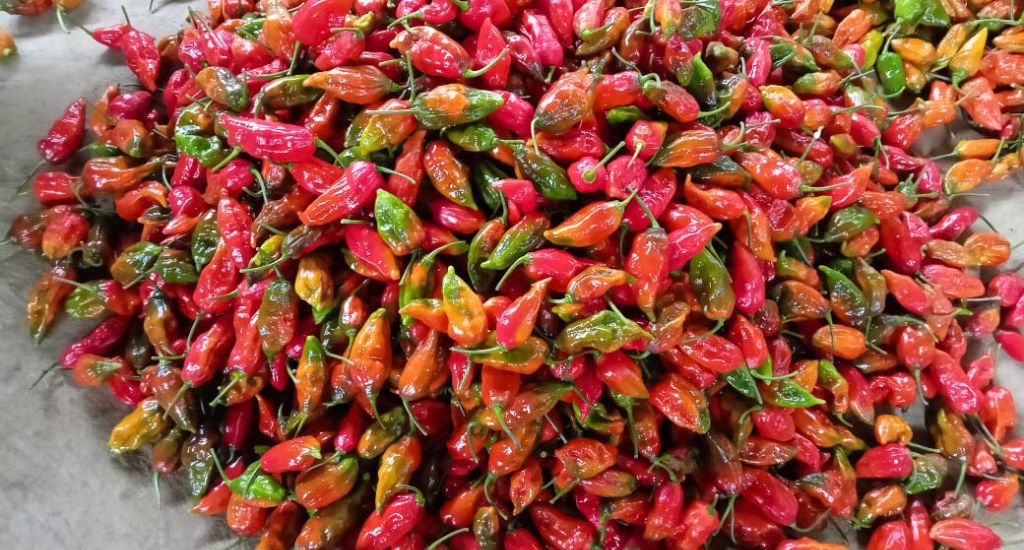
The ‘queen’ of king chillies in Assam
From growing them commercially to starting a nursery, this woman farmer helps others realise the market potential of bhoot jolokia – one of the hottest chillies in the world.

From growing them commercially to starting a nursery, this woman farmer helps others realise the market potential of bhoot jolokia – one of the hottest chillies in the world.
Jornali Saikia Hazarika shares an interesting myth about the ‘king chilli’, also called by other suitable monikers such as Naga chilli and bhoot jolokia – which translates as ghost chilli.
“If you eat one whole bhoot jolokia, you will start seeing ghosts, and hence the name for the chilli,” Hazarika said.
A resident of Moilapung, a remote village in Tinsukia district of Assam, Hazarika is renowned for her skill in growing this prized spice on a large scale.
One of the hottest chillies in the world, the Naga chilli has been traditionally used for food as well as medicinal purposes. King chilli is, in fact, an integral part of the cuisine of northeast India.
A keen entrepreneur, Hazarika realised the potential of growing king chilli on a bigger scale after undergoing a training session organised by Seven Sisters Development Assistance (SeSTA), a development organisation.

“We were exploring various cash crops and the kind of soil that is best suited for different crops. It then struck me that the demand for king chilli is high but the production has never been able to match the demand,” said Hazarika.
Also Read | Tribal woman ushers in organic farming in India’s last village
In the last couple of years, the demand has been fuelled by local, national and international demand. King chilli, with its pungency and unique aroma, has steadily been making its own space in kitchen shelves across many households.
“Instead of growing king chilli just for self consumption, I expanded the area to an acre to grow it commercially. I made a profit of more than Rs 2 lakh,” Hazarika said.
As she learnt new skills, she started growing king chilli using organic agricultural practices.
“The chillies retain their pungency and strong aroma only if we use organic inputs. King chilli can also be fragile and if chemical inputs are used, it withers easily during inclement weather,” she said.
Hazarika noticed a dearth of quality saplings for farmers to scale production. So last year this entrepreneur started a nursery to fulfil the increasing demand for king chilli.
Also Read | Tai Phake couple serves Assam tribe’s history on a plate

Farmers from far and wide now come to her village to buy the saplings. She sells the saplings in the weekly market too.
“I’m not only earning by selling the saplings, I’m also helping other farmers grow more king chillies,” she said with a smile.
As a krishi sakhi (farm friend) promoted by SeSTA, Hazarika not only trains other women farmers to grow king chillies but also inspires them to scale up to earn more. The Assam government recognised her work by honouring her with the Best Krishi Sakhi award.
“We are now a group of 50 women in our village growing king chilli. We can come together to make pickles and chilli powder since there is a high demand,” said Hazarika.

Naturally, the women credit her for their success.
“Jornali’s chilli nursery has changed the mindset of a number of farmers in our village. We now aspire not just to sell raw king chilli but turn it into exotic finished products. We needed someone to show us a path and Jornali has been our guiding star,” said Rita Hazarika, Jornali’s neighbour.
Jornali Hazarika smiled in contentment and nodded with the confidence of an entrepreneur who has already improved the livelihood of her villagers.
At this, Rita laughed and said, “Ask anyone in the village about king chilli and there is only one direction they point to.”
“One day our village will be known in the entire world as the king chilli village,” stated Jornali Hazarika boldly.
Also Read | Assam’s wildest jungle safari
The lead image at the top shows bhoot jolokia – one of the hottest chillies in the world (Photos by Preetisha Singha)
Preetisha Singha works as an executive at Seven Sisters Development Assistance, Assam.